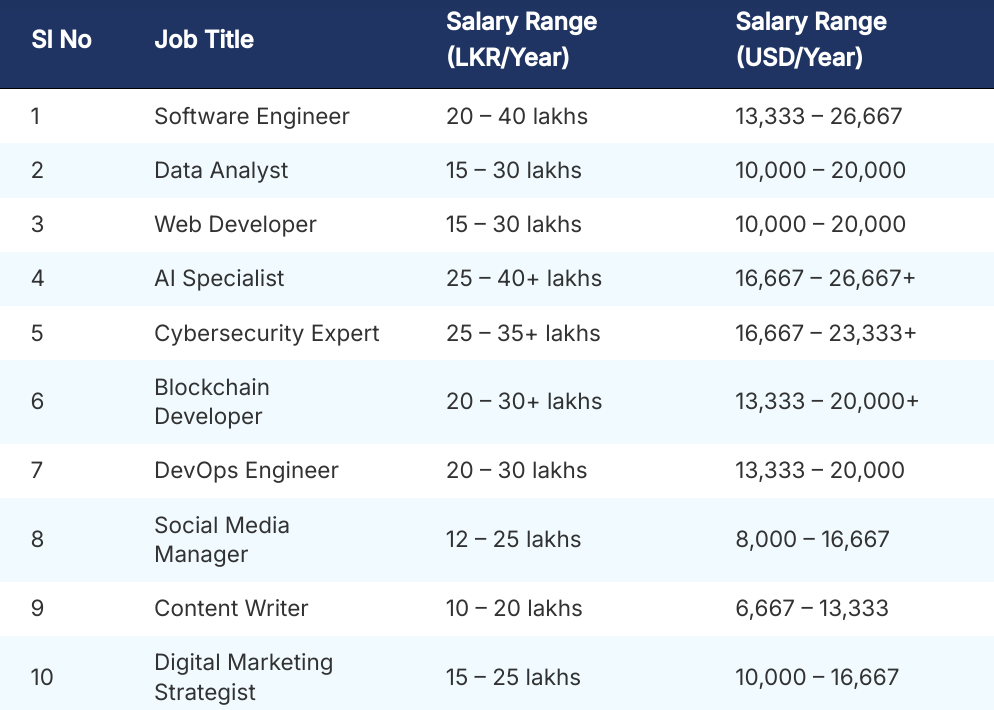- Home
- »
- Global-hiring-guide
- »
- Hire Employees in Sri Lanka
Hire Employees in Sri Lanka
Sri Lanka, a beautiful island in the Indian Ocean, is becoming a great place for global companies to find remote workers. The country has a diverse culture and a growing number of skilled people, especially in areas like IT, engineering, and customer service. With around 22 million people, Sri Lanka has a lot of talented individuals to offer. People in Sri Lanka are good at English, which is important for working with companies around the world.
More and more Sri Lankan professionals are choosing to work remotely, making it a positive trend. The country is flexible and ready to work with international businesses. This makes Sri Lanka a cool spot for companies to find skilled and adaptable workers, helping them grow globally.
-
Overview of Sri Lanka
-
Remote hiring and work trends
in Sri Lanka -
Top 10 highest earning remote
friendly jobs in the Sri Lanka -
Employment laws in Sri Lanka
Important considerations -
Employee probation period in Sri
Lanka -
Minimum wage in Sri Lanka
-
Working hours in Sri Lanka
-
Leaves and leave policies
in Sri Lanka -
Termination of employment
in Sri Lanka -
Why do companies hire
talent from Sri Lanka? -
3 Best ways to hire
employees in Sri Lanka -
Cost to hire employees
employees in Sri Lanka -
Enabling companies in the
search for talent in Sri Lanka

Overview of Sri Lanka
- Capital: Colombo
- Currency: Sri Lankan rupee (Rs) (LKR)
- Languages: Sinhala, Tamil and English
- Population: 22.04 Million (60th in world population)
- Payroll frequency: Monthly
- Timezone: UTC+5:30 (SLST)
- Cost of living rank: 189th out of 197
- GDP per capita: $3,293
Remote hiring and work trends in Sri Lanka
Global recognition
- #2 in Asia Pacific for remote work: That’s right, Sri Lanka beats out Bali and Thailand! (Kayak’s Work from Wherever Index, 2023)
- #13 globally: Forget Bora Bora, Sri Lanka is rubbing shoulders with Estonia and Portugal!
Job market boom
- IT and BPO leading the charge: 45% of remote job postings in Sri Lanka are in these sectors, meaning tech wizards and customer service ninjas can find their mojo. (Remoters Job Board, 2023)
- $1.2 billion in remote earnings: That’s a cool chunk of change flowing into Sri Lankan pockets, boosting the economy and fueling avocado toast dreams. (World Bank estimate, 2023)
Work-style shuffle
- 60% of companies embracing hybrid models: Office life ain’t dead, but it’s sharing the dancefloor with remote days. Work-life balance is the new disco.
- 85% of remote workers reporting increased productivity: Turns out, sunny beaches and flexible hours can actually make you work harder! Who knew?
The future is remotely incredible
- Government planning remote work regulations: Sri Lanka is getting serious about making remote work work. Expect streamlined processes and less paperwork than navigating Colombo traffic.
- $2 billion investment in digital infrastructure: Buckle up for faster internet, co-working spaces with ocean views, and maybe even robot waiters serving Lion beers.
Top 10 highest-earning remote-friendly jobs in Sri Lanka

Employment laws in Sri Lanka- Important considerations
- Probation period
- Minimum wage
- Working hours
- Leave policies
- Termination of employment
Employee probation period in Sri Lanka
No statutory mandate
No Sri Lankan law explicitly defines the length or conditions of an employee’s probation period. This leaves the onus on employers to clearly outline these details in the employment contract.
General practices
Customarily, probation periods range from six months to one year, with longer durations for managerial or technical roles. Some agreements allow extensions up to three months.
Shop and office employees act
This act applies to specific sectors like retail and clerical work. If a probation period is implemented, the employer must explicitly include it in the contract, outlining both the duration and potential termination circumstances.
Employment of Trainees Act
Though meant for training programs, this act allows contracts lasting up to one year. While not directly relevant to probation, it sheds light on the maximum permissible duration for assessing an employee’s performance.
Termination during probation
During the probation period, employers have the liberty to terminate employment without providing specific reasons. However, this freedom isn’t absolute. Legal precedence suggests termination must be done fairly and not based on discriminatory or unlawful grounds.
Minimum wage in Sri Lanka: As per latest employment laws and data
The minimum wage in Sri Lanka is established by the Wages Boards Ordinance and revised periodically through gazette notifications. This sets a benchmark for employee compensation, aiming to ensure a decent standard of living and prevent exploitation. As of December 2023, the key aspects of the national minimum wage are:
- Monthly Rate: LKR 12,500 (Sri Lankan Rupees)
- Daily Rate: LKR 500
- Effective Date: August 16, 2021
Working hours in Sri Lanka
Understanding working hours in Sri Lanka necessitates navigating a blend of statutory regulations and industry practices. The key legislation governing work hours is the Shop and Office Employees Act. Here’s a breakdown of the latest data:
Standard working hours
- Daily: 8 hours per day
- Weekly: 45 hours per week (can be extended to 48 hours under the Wages Board Ordinance, but overtime applies)
Overtime in Sri Lanka
- Any work exceeding the standard daily or weekly limits is considered overtime and must be compensated accordingly.
- Overtime hours in a week cannot exceed 12 hours.
- Overtime pay rates vary depending on the industry and collective bargaining agreements, typically ranging from 1.25 to 2 times the regular hourly rate.
Exceptions
- Certain occupations like security guards or hospital staff may have different working hours based on specific regulations.
- Certain industries like tourism or hospitality may have flexible working arrangements, but these should still comply with overtime regulations.
Rest periods
- Employees are entitled to a one-hour lunch break after 5 hours of work.
- Short breaks of 10-15 minutes are recommended every 2-3 hours.
Weekly rest
- Employees are entitled to one day of rest per week, typically Sunday.
- This rest day must be paid at the regular hourly rate.
Leaves and leave policies in Sri Lanka
Sri Lankan employees enjoy a comprehensive set of leave entitlements mandated by the Shops and Office Employees (SOE) Act No. 47 of 1954 and its amendments. These regulations ensure a healthy work-life balance and provide support during various personal and professional situations. Here’s a breakdown of the key leave types and policies as of December 2023:
1. Annual leave
- Employees are entitled to 14 days of paid annual leave for every completed year of service.
- For the first year, an employee’s leave entitlement is prorated based on the employment commencement date:
- 14 days if employment commenced before April 1st.
- 10 days if employment commenced between April 1st and July 1st.
- 7 days if employment commenced between July 1st and October 1st.
- Unused annual leave can be carried over to the following year, but not exceeding twice the annual entitlement.
- At least seven days of annual leave must be taken consecutively.
2. Weekly rest days
- Employees are entitled to one and a half days of paid rest per week. This is typically a full day on Sunday and a half-day on Saturday.
- However, the full pay entitlement applies only if the employee has worked at least 28 hours excluding overtime during the week.
- Rest days can be postponed and taken in 5-weekly blocks in exceptional circumstances, with the Commissioner’s approval.
3. Casual eave
- Employees are entitled to seven days of paid casual leave per year, starting from the second year of employment.
- During the first year, the employee earns one day of casual leave for every two completed months of service.
- Casual leave can be used for personal errands, illness, or other unforeseen circumstances.
4. Sick leave
- No separate entitlement for sick leave exists.
- Employees can use casual leave for short-term illness.
- For longer illnesses, medical certificates may be required, and employees may be entitled to additional leave based on company policies or doctor’s recommendations.
5. Maternity leave
- Female employees are entitled to 16 weeks of paid maternity leave, eight weeks before and eight weeks after childbirth.
- During this period, they receive full pay based on their average earnings for the previous 12 months.
- Additional benefits like health insurance and childcare assistance may be offered by employers.
6. Paternity leave
- Fathers are entitled to five days of paid paternity leave upon the birth of their child.
- This leave can be taken at any time within six months of the child’s birth.
7. Other leave types
Some companies may offer additional leave types, such as bereavement leave, study leave, or religious holidays, at their discretion.
8. Additional points
- Leave policies can vary slightly between companies and industries. It’s always best to consult your employer’s specific leave policy for detailed information.
- Employers must maintain leave records and ensure fair and transparent application of leave policies.
- Violations of the SOE Act regarding leave can result in penalties for both employers and employees.
Termination of employment in Sri Lanka
Termination of employment is a complex process in Sri Lanka, governed by a framework of laws and regulations designed to protect employees’ rights and ensure fair treatment. Here’s a breakdown of the key aspects as per the latest data.
1. Governing laws
Two primary statutes govern termination in Sri Lanka:
- Industrial Disputes Act No. 43 of 1950: Applies to all employees except those covered by the Termination of Employment of Workmen (Special Provisions) Act. It sets out procedures for resolving employment disputes and provides for reinstatement as a remedy for unfair termination.
- Termination of Employment of Workmen (Special Provisions) Act No. 45 of 1971: Applies to “workmen” defined as manual, clerical, supervisory, and technical employees in various industries. It mandates specific requirements for termination, including notice periods and severance pay calculations.
2. Notice periods
The required notice period depends on the employee’s length of service and the applicable law:
- Under the Industrial Disputes Act: Notice period is not explicitly stated but is considered as a common law requirement. Courts generally determine reasonable notice based on factors like an employee’s position, length of service, and local customs. Typically, it ranges from 1 month for junior employees to 3-6 months for senior positions.
- Under the Termination of Employment of Workmen Act:
- Less than 1 year of service: No notice required.
- 1 to 2 years of service: 1 month’s notice.
- 2 to 5 years of service: 2 months’ notice.
- More than 5 years of service: 3 months’ notice.
3. Severance pay
Severance pay is due to employees upon termination under both Acts, calculated based on the employee’s last drawn salary and length of service:
- Under the Industrial Disputes Act: No specific formula, but courts consider fair and equitable compensation based on relevant factors.
- Under the Termination of Employment of Workmen Act: Formula based on last drawn salary and years of service:
- Less than 2 years: 1 month’s salary for each completed year.
- 2 to 5 years: 2 months’ salary for each completed year.
- More than 5 years: 3 months’ salary for each completed year.
4. Exceptions and additional points
- Termination can be immediate without notice or severance for gross misconduct, endangering company property, or willful disobedience.
- Mutual agreement between employer and employee can set different terms for termination, including shorter notice periods or higher severance pay.
- Employees can challenge unfair termination through the Commissioner of Labour or the Labour Tribunal.
Why do companies hire talent from Sri Lanka?
1. Exceptional English proficiency
Global companies often choose to hire remotely from Sri Lanka because of the country’s high proficiency in English. Sri Lankan professionals are known for their strong command of the language, making communication smooth and effective in international business settings.
2. Cross-cultural collaboration
Sri Lanka’s multicultural environment and exposure to diverse influences make its workforce adept at collaborating with global teams. Companies from the worldwide appreciate the cultural adaptability of Sri Lankan professionals, facilitating seamless teamwork across borders.
3. Technical expertise in emerging technologies
Sri Lanka has a growing pool of skilled professionals, particularly in emerging fields like information technology. Global companies seeking expertise in cutting-edge technologies find Sri Lanka to be a valuable resource for recruiting talent with specialized skills and knowledge.
4. Cost-effective talent
Sri Lanka offers a competitive advantage in terms of cost-effective talent without compromising on quality. Companies can leverage the skilled workforce in Sri Lanka to manage projects efficiently and cost-effectively, making it an attractive option for remote hiring.
3 Best ways to hire employees in Sri Lanka
To efficiently recruit employees in Sri Lanka, businesses can consider three specific strategies customized to their individual needs and goals. The selection of the most appropriate approach depends on factors like long-term business plans, budget limitations, time constraints, workforce needs, and the scale of the hiring process.
1. Establish a local entity in Sri Lanka
Setting up your business officially in Sri Lanka is like building a strong base for your work, hiring the right people, and connecting with the market. It means understanding the local rules and making good connections with clients and partners. Creating a legal presence is super helpful if your business plans to grow a lot in Sri Lanka for a long time. But if you’re thinking of short projects or just having a small team without big future plans, this might not be the best idea.
2. Partner with an Employer of Record in Sri Lanka
Teaming up with a local helper, like an Employer of Record (EOR), in Sri Lanka is a smart move. It makes entering the job market easier and helps you hire faster. The EOR takes care of local tasks like payroll, benefits, and following the rules. This makes everything simpler legally, so you can quickly set up and start working on your main tasks. Choosing an EOR like Global Squirrels in Sri Lanka makes it easy to find local workers and makes the hiring process smooth.
3. Engage independent contractors in Sri Lanka
Choosing independent workers in Sri Lanka gives you a flexible and effective way to get special skills and services. This helps businesses use professional knowledge without having to commit for a long time like in regular jobs. Independent workers are super useful for projects that are not very long or for specific tasks. This way, businesses can use their resources well. But, companies need to be careful not to mix up things with these workers because it can cause problems like paying them for the past, getting fined, facing legal issues, and other big problems that can hurt a company’s name.
Cost to hire employees in Sri Lanka
Hiring in Sri Lanka involves more than just paying the employee. There are different costs you need to think about, such as:
- Fees for setting up a company in Sri Lanka
- Costs if you use employment agencies
- Money spent on events for hiring
- Advertising expenses for job ads
- Travel costs if your hiring managers visit Sri Lanka
- Payment for recruiters’ time and work
- Salary and bonuses for the new employee
- Money for helping the new employee move
- Charges for checking the background and references of the new employee
All these things add up and make the overall cost of hiring in Sri Lanka.
Global Squirrels: Enabling companies in the search for talent in Sri Lanka
Join hands with Global Squirrels for an amazing teamwork journey to make hiring employees in Sri Lanka super easy! Our smart technology makes hiring simple and helps you find great talent globally without any hassle.
Are you excited to try this new way of hiring in Sri Lanka? Let’s start now! Sign up, and let’s discover all the amazing possibilities together! If you have any questions or need help, schedule a demo with our expert team!


